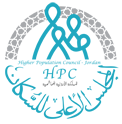

HPC Secretary General and Chairperson of the Arab Council for Population and Development, Dr. Abla Amawi, chaired on Sunday a virtual ACPD executive office members meeting, during which Dr. Abla Amawi was elected as chair of the executive office for the second ordinary session, which will start tomorrow, Monday.
The meeting aimed to follow up on the decisions made at the first ordinary session, outline the Arab Population Planning Strategy, discuss the Covid-19 impact on efforts of Arab states to benefit from the demographic dividend and their readiness to deal with disasters and crises. The meeting also discussed conducting an analysis of the epidemiological situation and its impact on the population in the Arab states.
In preparation for the 54th Session of the UN Commission on Population and Development, which will be held under the theme “Population, Food Security, Nutrition and Sustainable Development”, the meeting discussed means to coordinate the positions of participating Arab states, introduce the population development composite index (PDCI) to Arab states, and provide training in related data collection methods.
Amawi confirmed during the meeting that the Arab region is faced by enormous political, economic and social challenges, which have an impact on population, development, and citizens’ life and wellbeing. Arab states suffer from high unemployment and poverty rates, low economic participation of women, the consequences of displacements and other challenges, which have all been exacerbated by the Covid-19 pandemic, resulting in more pressure on countries that is likely to continue well after the pandemic is over, unless there were sound, well-targeted, scientific and balanced plans in place.
Amawi indicated that population planning in the Arab region is faced by challenges, including mainly the fact that integrated population planning is limited and rarely goes beyond population policy documents and strategies or sectoral development policies that do not truly integrate population issues. Other challenges include the lack of sufficient and consistent budget allocations from national sources to support the formulation and execution of population plans, the shortage of population planning specialists in national population commissions and councils, and the difficulty of benefiting from the demographic benefit across the region if the same approaches, work methods and visions continue to be used.
According to a report by ESCWA on the “Challenges in the Arab Region During Covid-19”, 44 million individuals in the Arab region need humanitarian assistance in water, sanitation, medical supplies or healthcare due to the pandemic and that 24 million of those who need the assistance are either refugees or internally displaced persons. Moreover, the middle class in the Arab region is expected to shrink as the number of poor persons has exceeded 100 million following the pandemic, up from 93.1 million before the pandemic. In addition, reports and studies have revealed that the economic participation of women in the Arab region is low, women make up only 21% of the workforce, and 700 thousand jobs held by women in the Arab region are expected to be lost due to Covid-19 consequences. Amawi pointed out that 37% of women in the Arab region experience violence and that studies have shown an increase in the rates of violence against women due to social isolation, forced coexistence, and growing economic pressure resulting from the pandemic.
Amawi pointed out that given the prevailing conditions, the consequences of the Covid-19 pandemic will be greater on refugee and displaced women as well as women with disabilities, and such consequences will not only be limited to the risk of infection but will also include increased violence and sexual exploitation and abuse. Amawi added that women and girls in the refugee and internally displaced persons communities in the Arab region already suffer from health risks and are often unable to access healthcare services and appropriate facilities, as the obstacles and challenges increase due to the pandemic. 80% of refugees and displaced persons around the world live in low and middle income countries, many of which have weak health, water and sanitation systems and need urgent assistance. It is worth noting that the Arab region hosts almost half of the total refugee population around the world, including 5.4 million refugees in UNRWA fields of operation.







